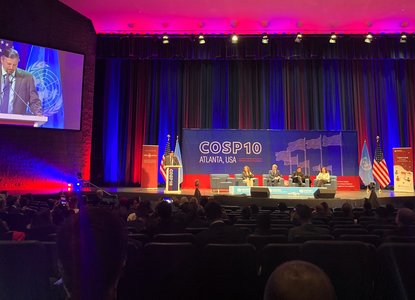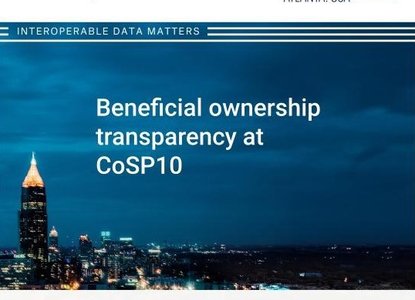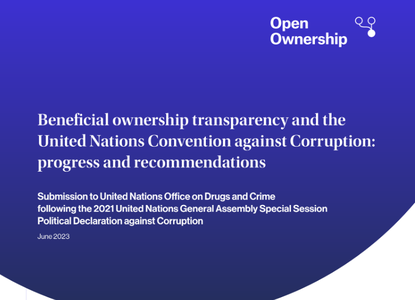The power of partnerships to combat corruption
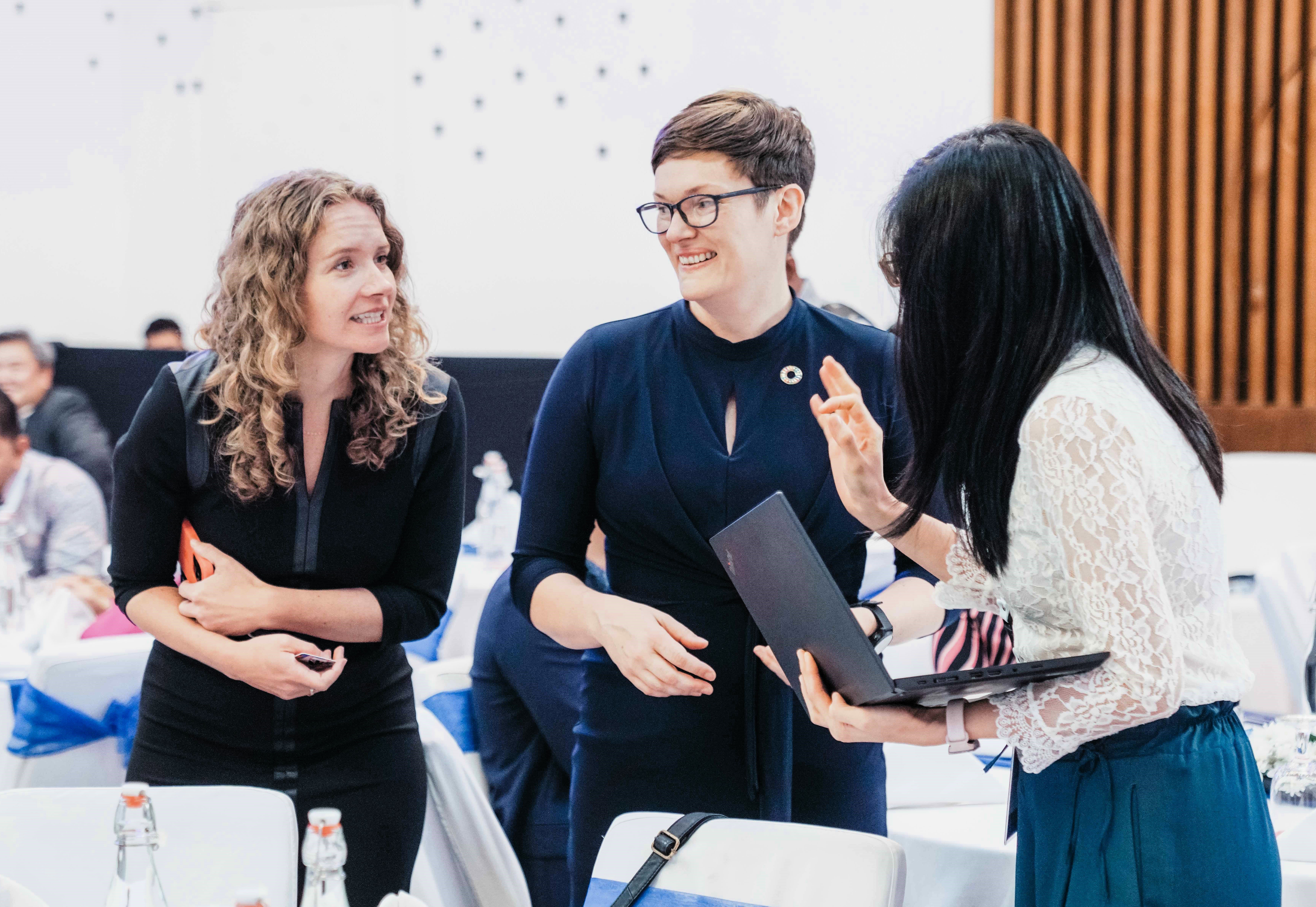
Kari Lucas, Crime Prevention and Criminal Justice Officer at UNODC, and Louise Russell-Prywata, Deputy Executive Director of Open Ownership at the recent Southeast Asia Peer Exchange co-organised by UNODC, the Stolen Asset Recovery Initiative (StAR), Open Ownership, and the Ministry of Law and Human Rights - Republic of Indonesia.
The United Nations Convention Against Corruption (UNCAC) is the only legally binding universal anti-corruption instrument. It was adopted by the United Nations General Assembly in 2003. The Conference of the States Parties (CoSP) – the main decision-making body of the Convention – stands as a pivotal platform to promote collaboration, identify emerging challenges and shape collective global efforts in the years ahead. Resolutions adopted at the sessions of the Conference shape the direction of future policies.
The United Nations Office on Drugs and Crime (UNODC) is the guardian of the Convention. UNODC supports States parties as they translate their commitment under the UNCAC into reality. Since 2022, Open Ownership and UNODC have been collaborating closely to drive transparency and accountability in corporate ownership and control, as a way to advance the UNCAC and CoSP resolutions related to beneficial ownership (BO) reforms. As a result of this collaboration, we have jointly supported over 25 countries and 150 public officials and other stakeholders in 2023 and 2024.
This post reflects an interview carried out with Kari Lucas, Crime Prevention and Criminal Justice Officer at UNODC, and Louise Russell-Prywata, Deputy Executive Director of Open Ownership, about the joint efforts of both organisations to ensure that BO data is not only available but also utilised to maximise its impact in the fight against corruption.
Q: Could you paint a picture of the current state of implementation of beneficial ownership transparency reforms?
Louise:
Over the past two decades, beneficial ownership transparency (BOT) has fast become an international norm. The most common way countries are achieving this is by the government establishing a registry of beneficial owners and requiring all companies to submit information on their beneficial owners to that country’s register. Over 150 countries have committed to beneficial ownership transparency globally, and over 80 now have live beneficial ownership registers.
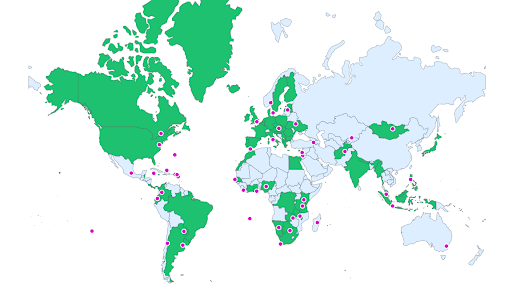
Countries in green have live BO registers. The pink dots represent where Open Ownership is engaged. Information based on Open Ownership’s internal records
Much of the progress to date has been driven by anti-money laundering initiatives and compliance with Financial Action Task Force recommendations. For countries that are implementing the Extractive Industries Transparency Initiative standard, this has also led to improving beneficial ownership transparency for companies in the mining, oil and gas sectors. We have seen the UNCAC be a valuable platform to expand and advance countries’ efforts on beneficial ownership transparency, especially in light of the first dedicated UNCAC resolution on beneficial ownership transparency in 2021 (9/7), and the follow up 10/6 in 2023.
These resolutions have increased demand from countries implementing the UNCAC for technical support to advance beneficial ownership reforms. We’re delighted to be working with UNODC to help countries strengthen their legal and policy frameworks, implement or improve BO data collation and interoperability, and promote better BO data use. These countries include Armenia, Indonesia, Nigeria, Philippines, South Africa and Zambia.
Kari:
The pace of reforms in this area has been remarkable in recent years. BOT has been increasingly recognised as a critical tool for addressing corruption and tackling the misuse of corporate vehicles to conceal proceeds of corruption.
Out of UNODC’s ten regional anti-corruption platforms covering 88 jurisdictions, seven include objectives to promote beneficial ownership. 2023 data shows that 55 countries have a legal framework in place on BO, with the vast majority having set up beneficial ownership registers. Most of these reforms took place over the last few years.
Q: Why are these reforms needed?
Louise:
Time and again, illicit financial flows – the proceeds of corruption and other financial crimes – are moved around the world using anonymously owned companies. This contributes to an environment of secrecy that enables corruption and all kinds of financial crime to remain undetected. When crimes are uncovered, efforts to follow the money in order to seize and return stolen assets run into a dead end when anonymously owned companies have been used to hide ownership. This is a transnational problem, with networks of anonymously owned companies, as well as other corporate vehicles such as trusts, spanning several jurisdictions in order for criminals to hide the proceeds of their illicit activity.
This transnational problem requires transnational solutions: beneficial ownership information needs to be available, and to be connected internationally so that anti-corruption actors can use it to better prevent, detect, and combat corruption.
Kari:
Lack of corporate transparency and the misuse of corporate vehicles – big players hiding behind complex ownership and control structures – are significant challenges to successful corruption cases. Recovering proceeds of corruption is complex, particularly when multiple jurisdictions are involved. In a Stolen Asset Recovery (StAR) Initiative survey, nearly 70 responses from countries identified difficulties in identifying and verifying the beneficial ownership of suspected corruption proceeds as a significant obstacle to recovering proceeds of crime.
Schemes that are used to hide who really owns or controls a legal entity often span borders, with entities and owners in multiple countries. Access to beneficial ownership information is crucial for tracing and confiscating proceeds of crime, including those from corruption, and is vital for asset recovery and return.
"This transnational problem requires transnational solutions: beneficial ownership information needs to be available, and to be connected internationally so that anti-corruption actors can use it to better prevent, detect, and combat corruption." - Louise Russell-Prywata, Open Ownership
Q: What challenges do you see in the implementation of these reforms?
Louise:
Beneficial ownership transparency is still a relatively new area of reform, and technical details can be challenging. There are three challenges that we are most often asked by governments for advice and support with:
- First, the challenge of verifying that the beneficial ownership information companies report is accurate and up to date.
- The second challenge is awareness and compliance. In our experience supporting over 40 countries from around the world, we’ve seen that when new reporting requirements are introduced, companies need clear communication and guidance to ensure they are aware of what needs to be reported to whom and how to properly identify and disclose their beneficial owners.
- Third, there are challenges with analysing and making use of the data. In order to maximise its impact, BO data needs to be connected with other domestic datasets (such as tax records, procurement contracts, assets declarations or fishing licences), as well as with BO records from other jurisdictions or international sanctions lists. Open Ownership's Beneficial Ownership Data Standard provides guidance and recommendations on how BO data should be collected, stored and shared to maximise the data's analysis and usability domestically and internationally.
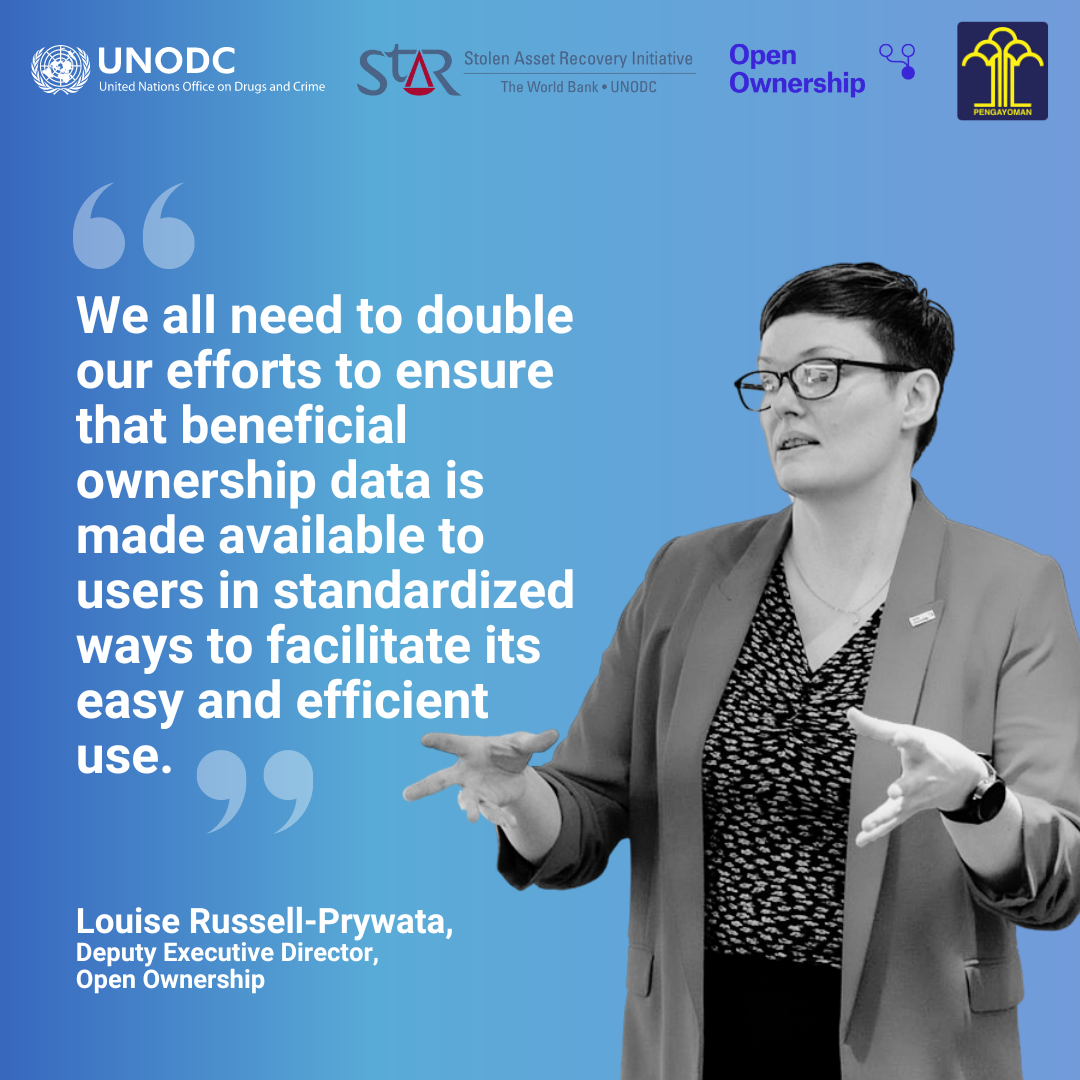
Kari:
Ultimately, what we want is adequate, accurate and up-to-date information. Common challenges we’ve seen are frameworks that don’t cover all legal entities and arrangements or fail to provide appropriate sanction mechanisms to foster strong compliance, limited verification, limited or untimely access to information by authorities, and insufficient cooperation efforts and data exchanges, both at the national and international level. All of these challenges limit the power of beneficial ownership information to be used for things like corruption investigations, asset recovery, procurement and tax integrity.
Q: Data is power, but to be able to use beneficial ownership data to investigate corruption and foresee corruption risks, training is needed. How do UNODC and OO work together to address this?
Louise:
Effectively implementing beneficial ownership transparency and making good use of the data demands investment and highly technical resources to maximise its impact. Together with UNODC, we’ve collaborated and led on training sessions in regional workshops in Latin America, Southeast Asia, and across the African continent, and trained almost 150 government officials from corporate registers, financial intelligence units, anti-corruption and tax agencies, and procurement departments.
Our workshops include sessions on demystifying beneficial ownership with examples and practical exercises to ground key concepts, run through common challenges and technical details on what is needed to comprehensively implement BO registers (building on the Open Ownership Principles), and share country efforts and best practices to demonstrate progress.
Kari:
Since 2022, we’ve been working together to combine the best of our organisations so that we can provide the best support possible to countries as they establish and implement beneficial ownership transparency regimes. We do this through training, peer exchanges, support on laws, policies and regulations and ongoing research and evidence-building on good practices. Open Ownership provides unique expertise on beneficial ownership reforms, and partnering with them ensures that we can deliver the best services to support States parties’ BO goals, including the implementation of CoSP resolutions 9/7 and 10/6.
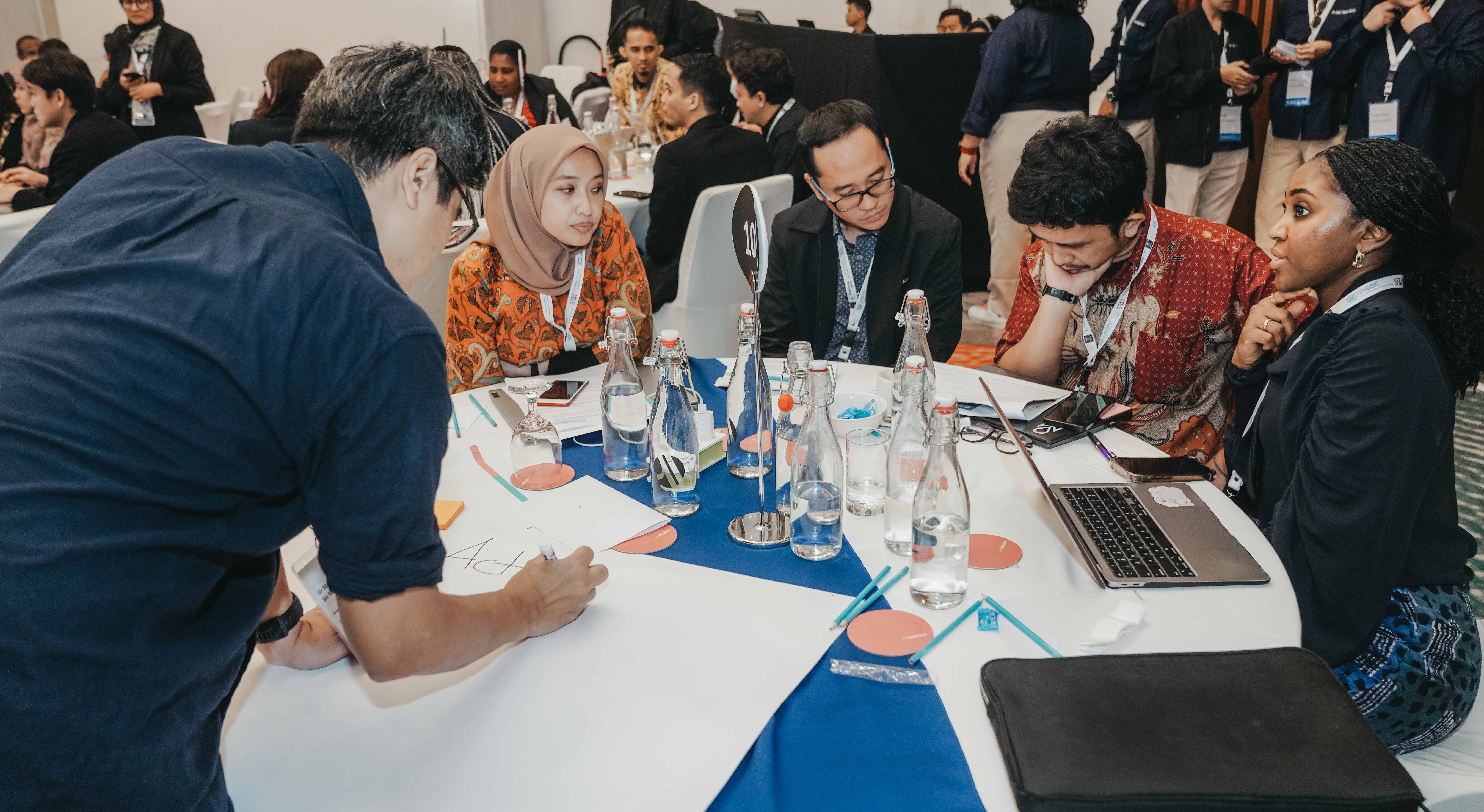
Group work at the recent Peer Exchange on Advancing Anti-Corruption in Southeast Asia through Beneficial Ownership Transparency, which gathered participants from across Southeast Asia. The Peer Exchange wsa co-organised by UNODC, the Stolen Asset Recovery Initiative (StAR), Open Ownership, and the Ministry of Law and Human Rights - Republic of Indonesia.
Q: What is the added benefit for both organisations to work together? What are the next steps?
Louise:
Open Ownership and UNODC’s partnership brings the best of the two organisations together: our technical expertise on implementing BO registers and using BO data for impact, combined with UNODC’s mandate to support UNCAC’s implementation ensuring there is sufficient international support and multilateral engagement in domestic reforms. UNODC’s commitment to supporting countries in advancing substantive reforms that drive impact is crucial for the agenda to continue at the forefront of key reforms needed to ensure countries have sufficient information to prevent, detect, investigate and sanction corruption acts and other criminal offences that hinder economic and social development.
Beyond this, we look forward to continuing and deepening our partnership with UNODC to support countries to implement BO reforms, as well as strengthen our engagement with key data users, such as anti-corruption agencies, procurement departments and fishing licensing authorities to maximise the use of BO information to strengthen governance and accountability in key sectors.
Kari:
Our partnership ensures that we can build trusted, long-term relationships with our counterparts. For example, in the Philippines, we’ve jointly designed trainings for authorities on the value of using beneficial ownership information, helped facilitate data-sharing agreements between the Securities and Exchange Commission (SEC) – which holds the information – and other authorities, and provided direct support to the SEC, both on circulars which provide sanctions for non-compliance with requirements to declare beneficial ownership information and on the future design of their register. Our partnership helps ensure that we can provide sustainable, innovative support and bring in our diverse but complementary expertise, both at the national and regional levels and in broader policy arenas.
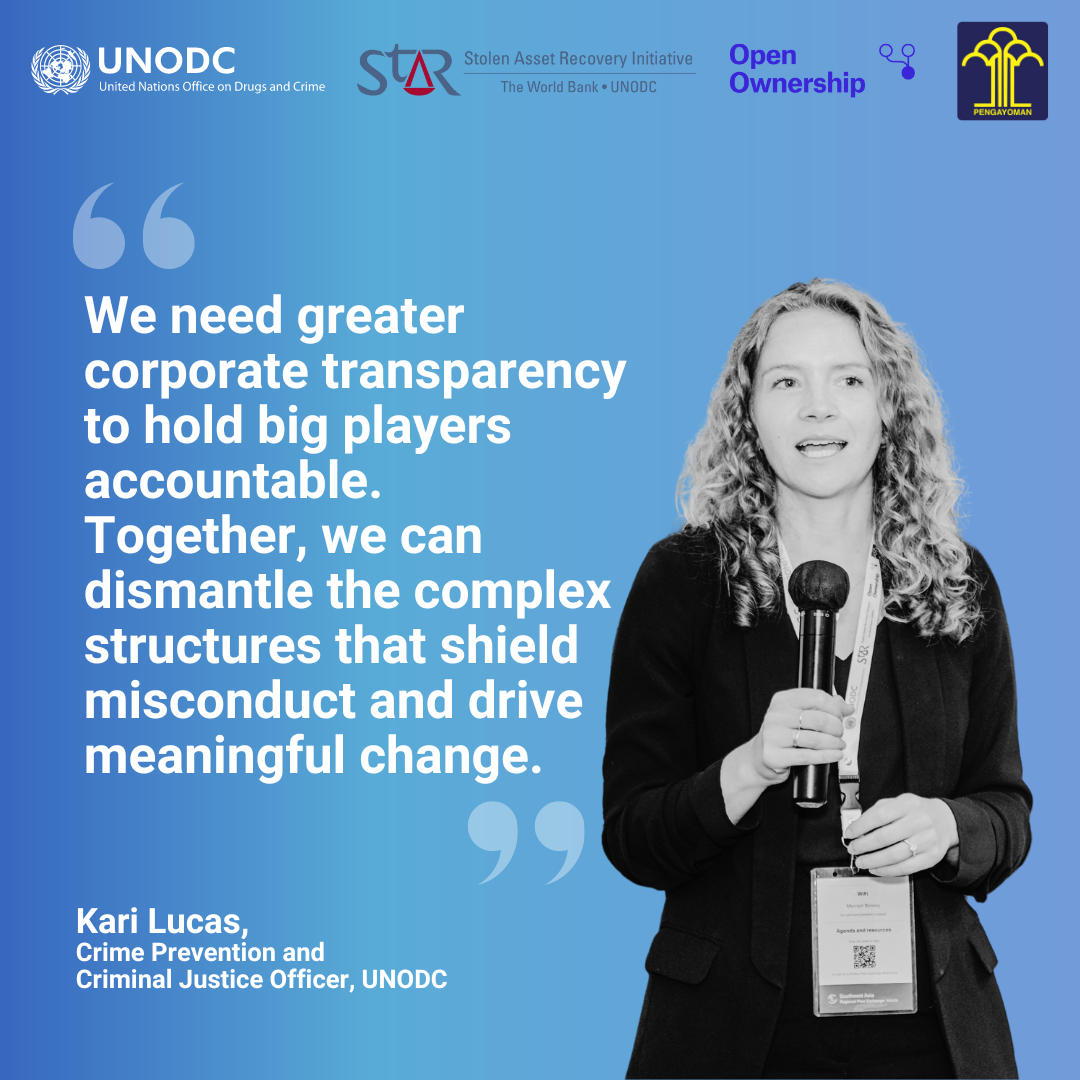
Related articles and publications
Publication type
Blog post
Topics
United Nations Convention against Corruption (UNCAC)
Sections
Implementation
